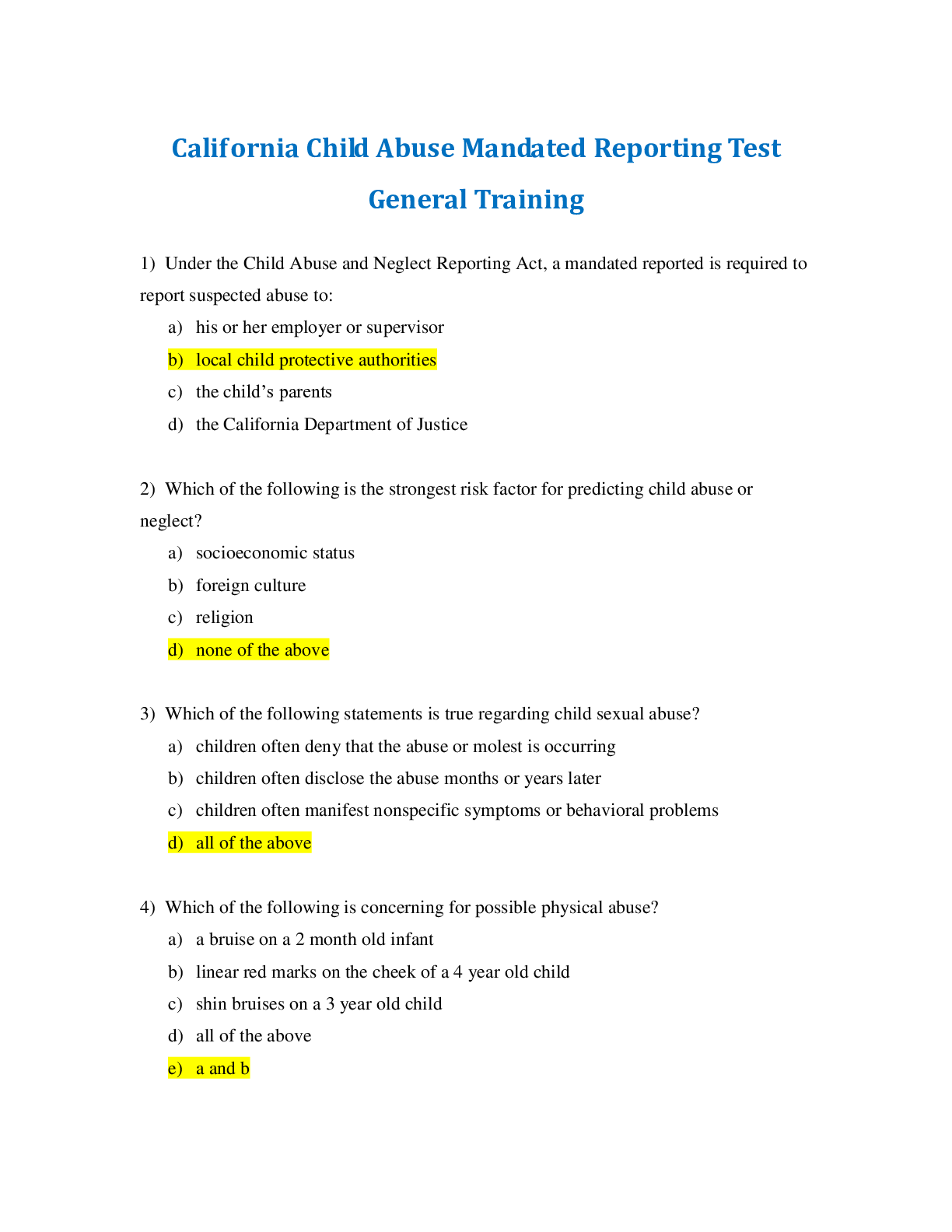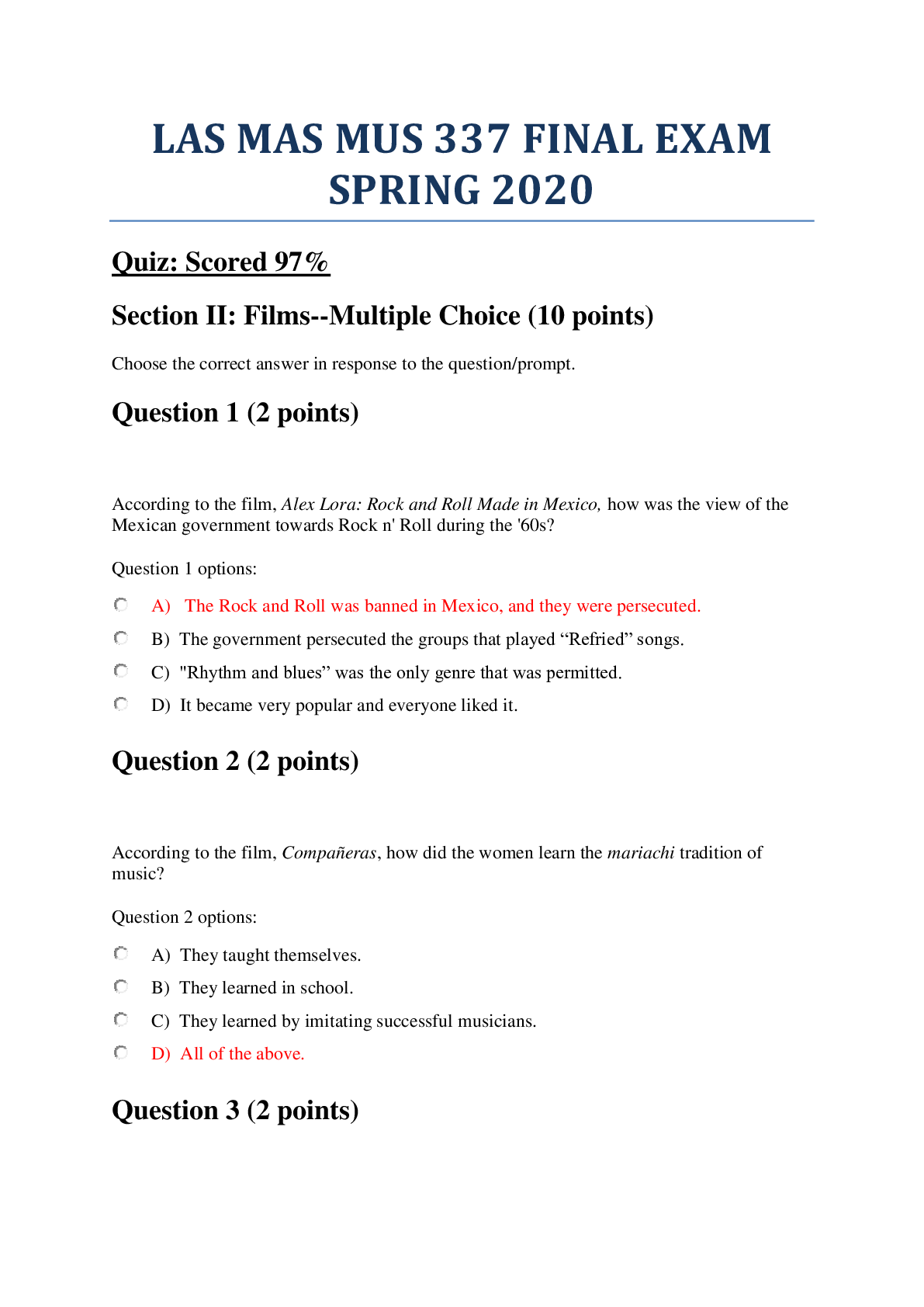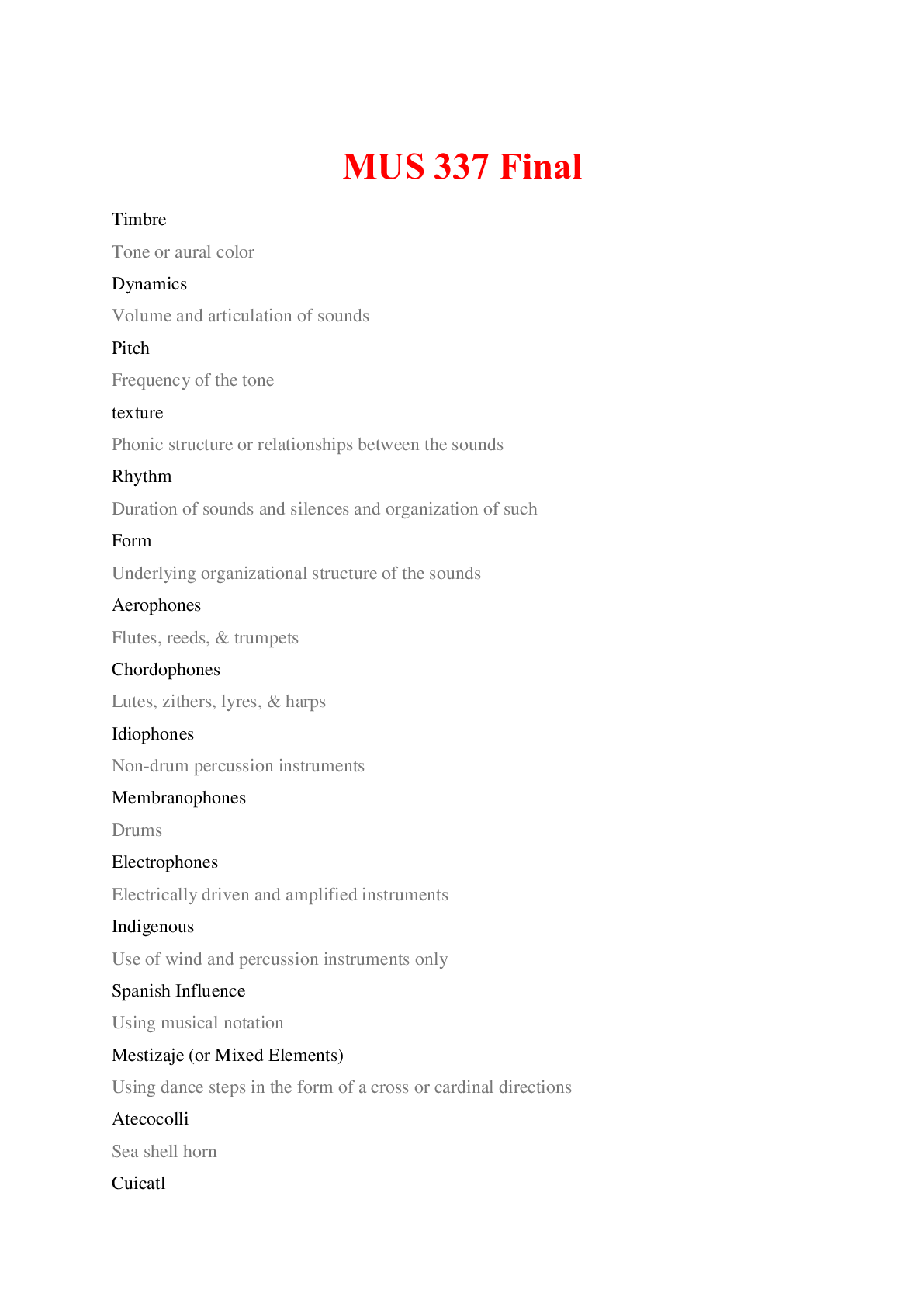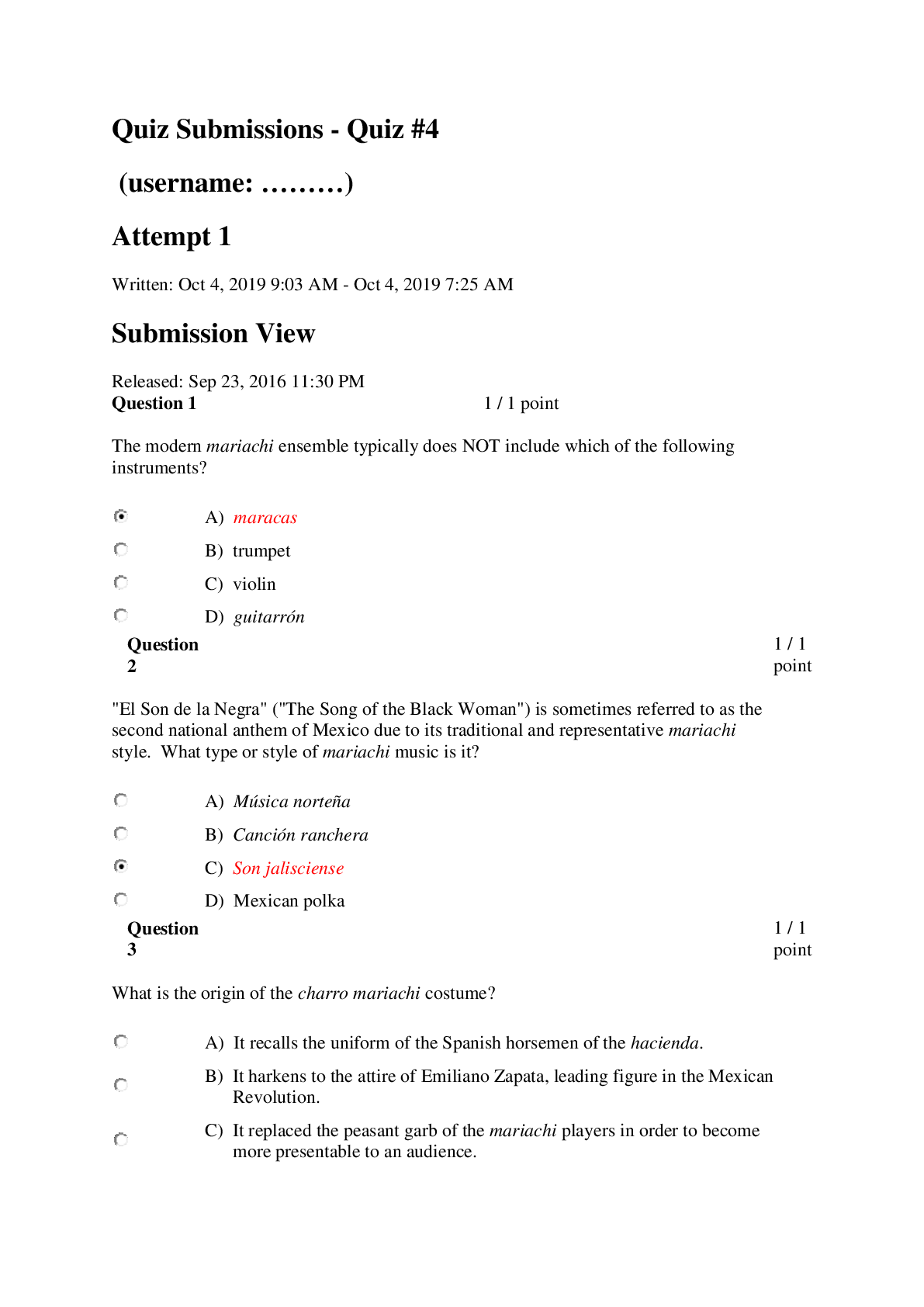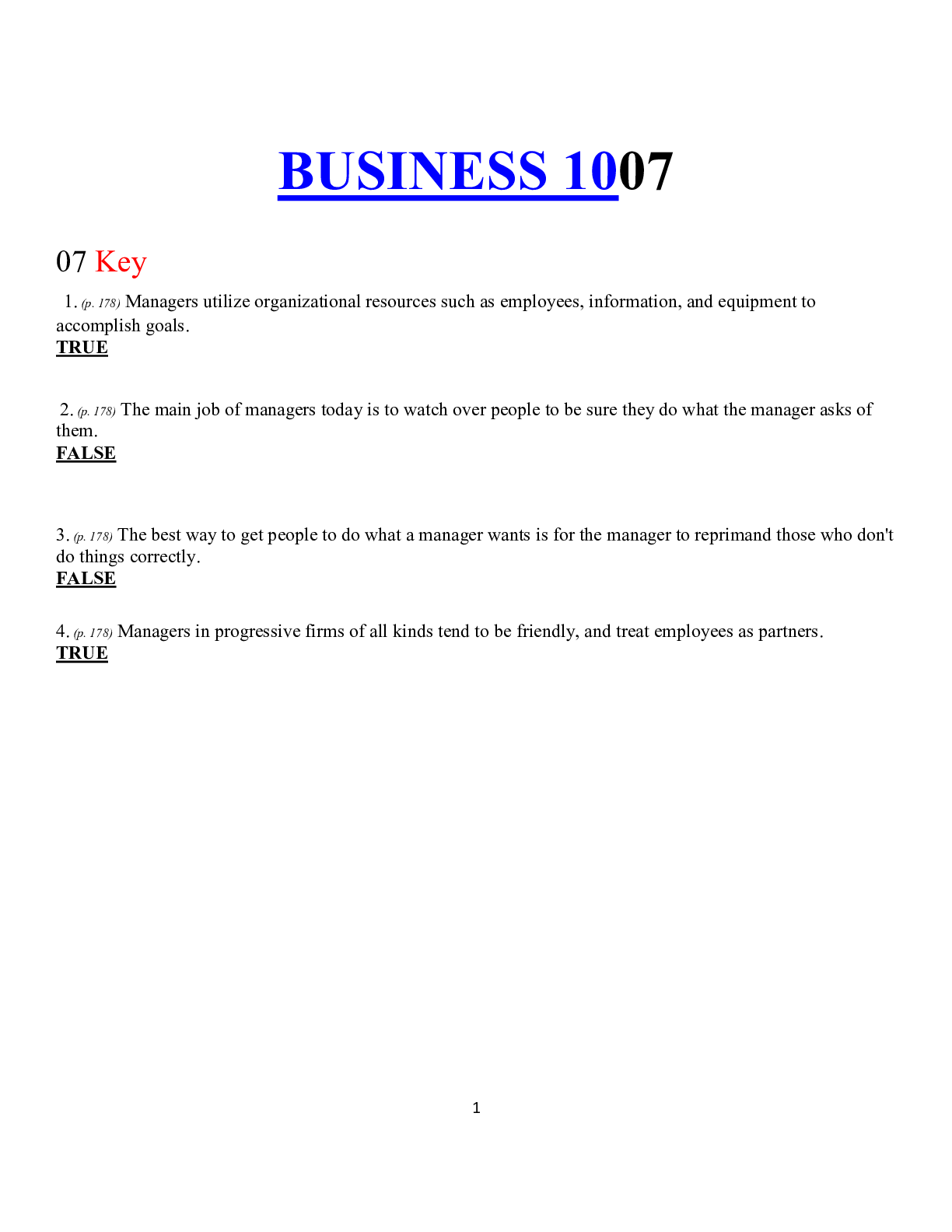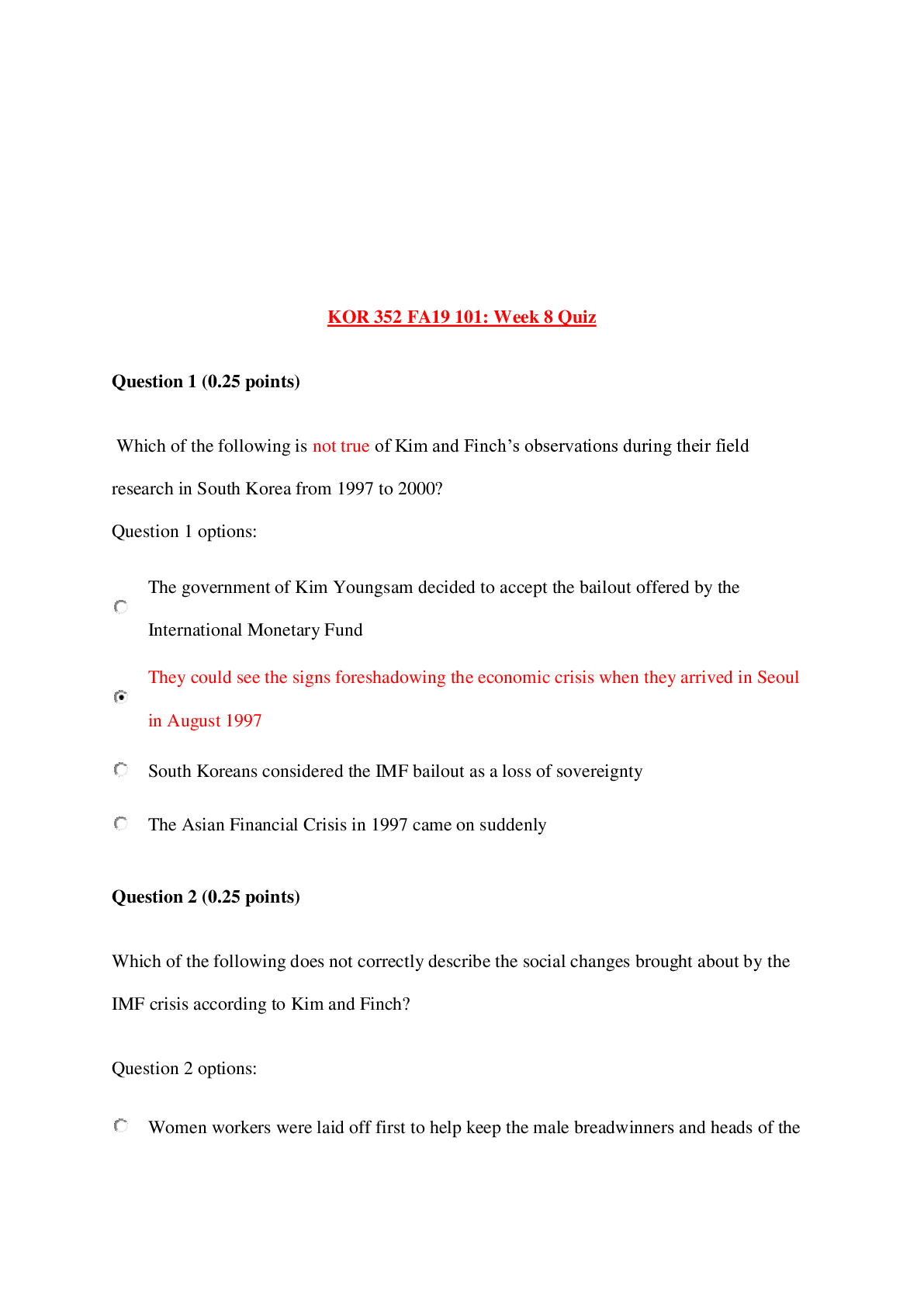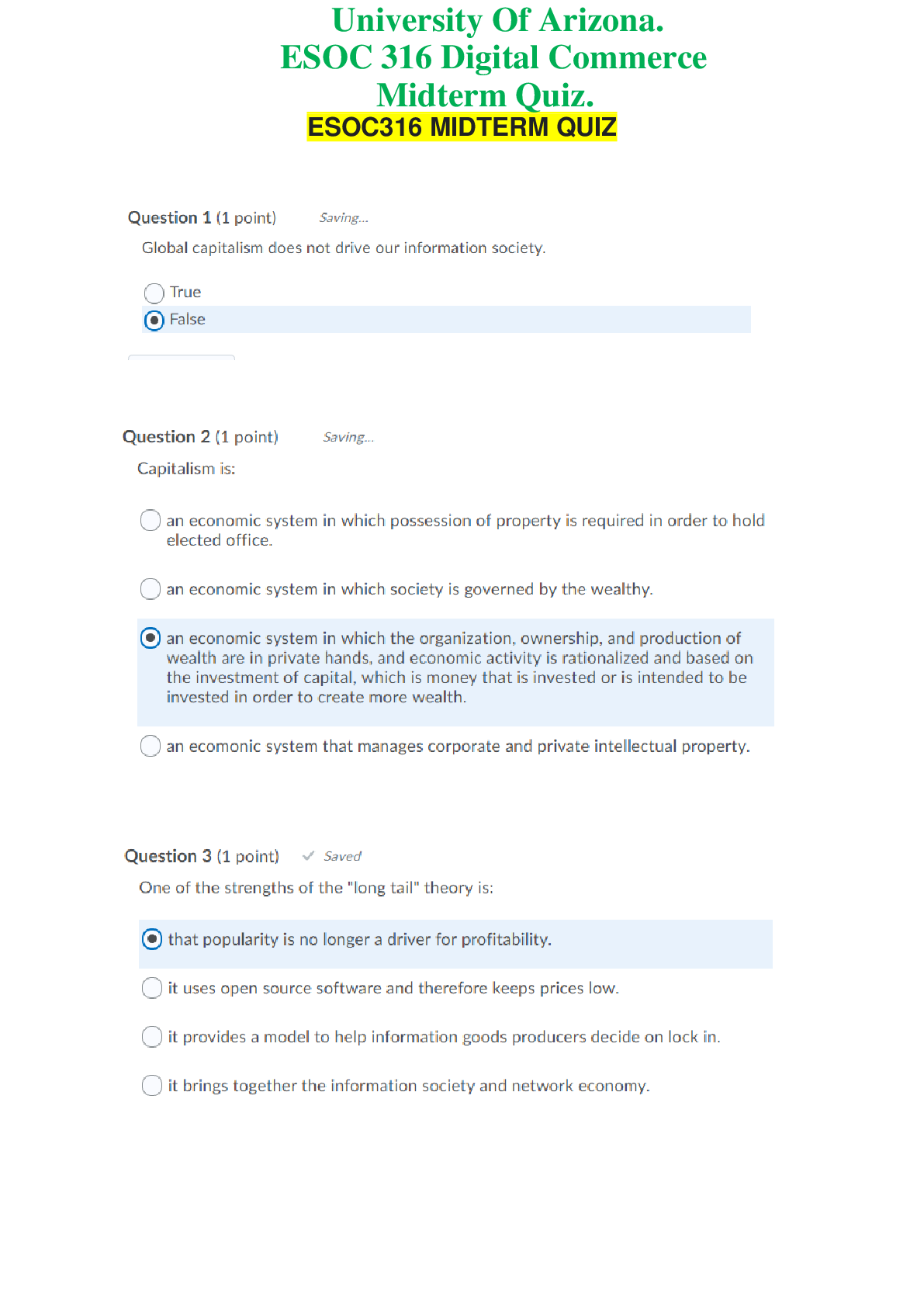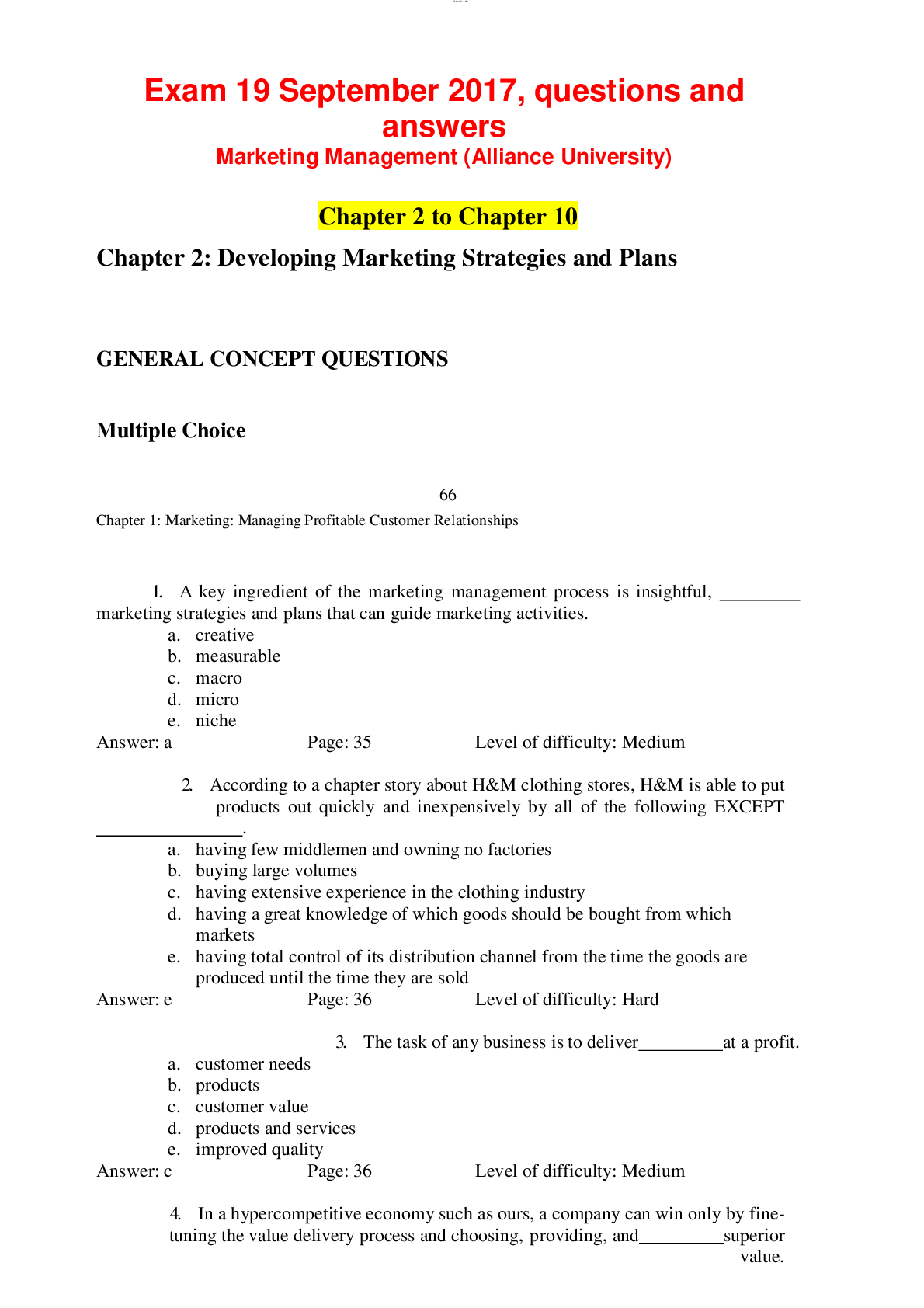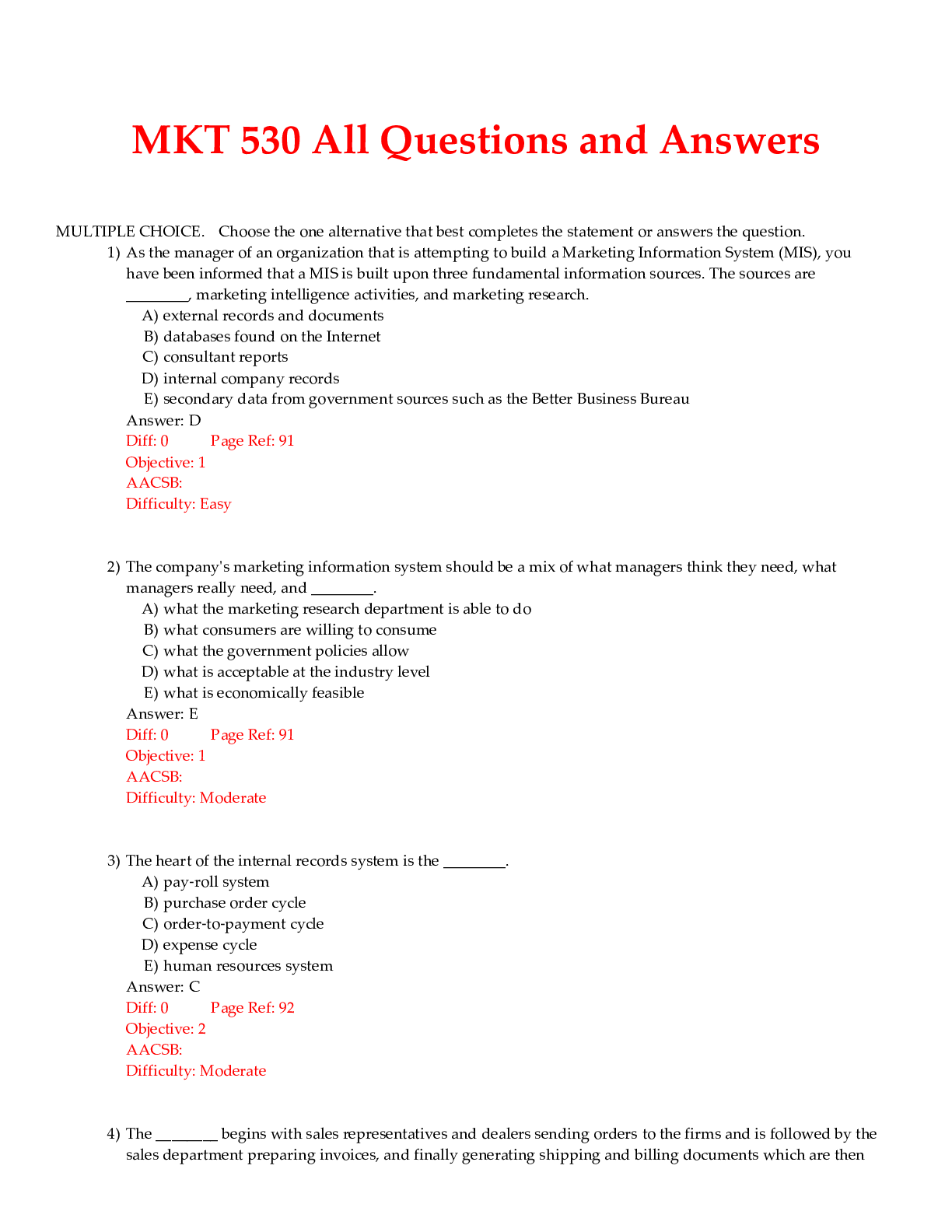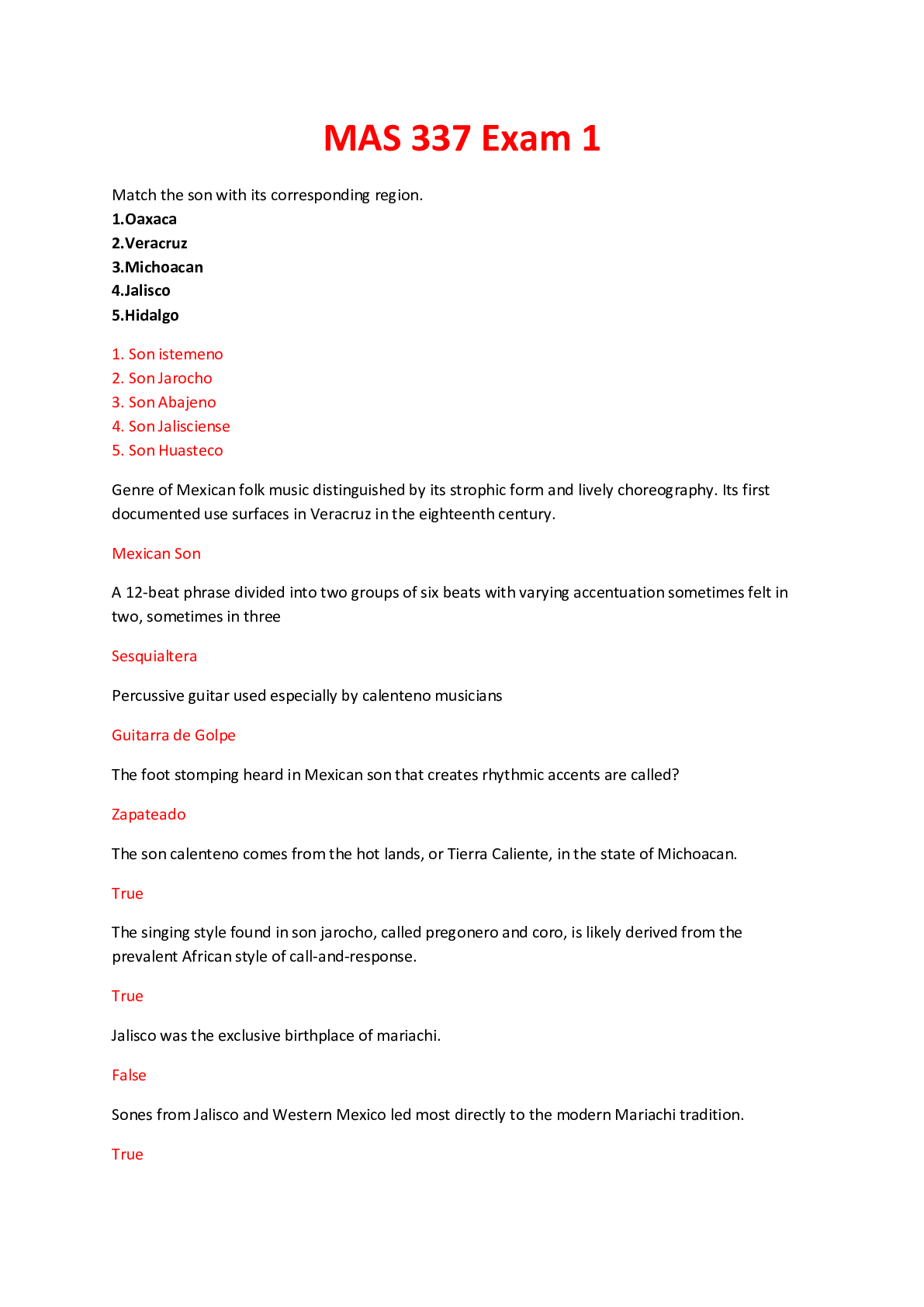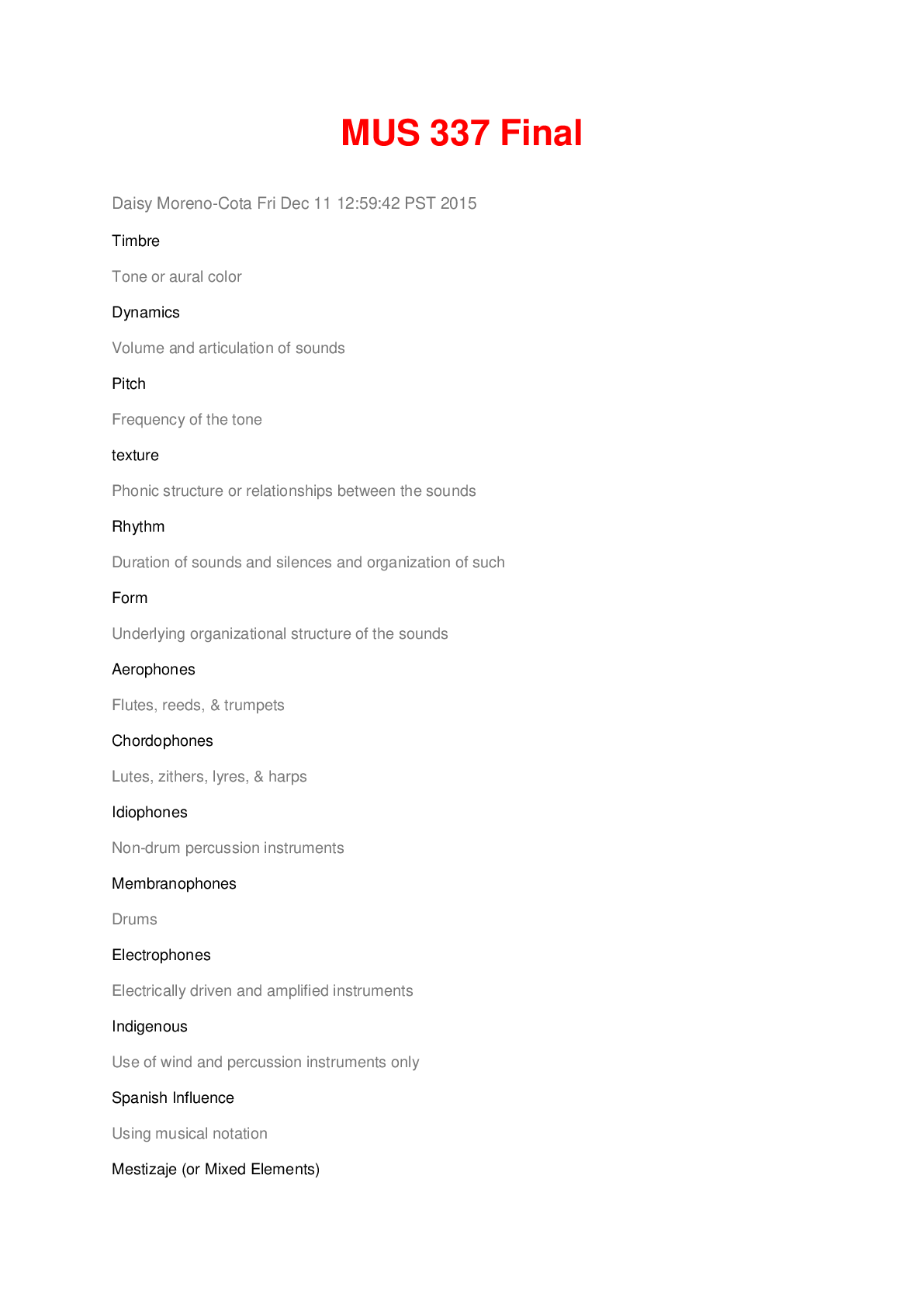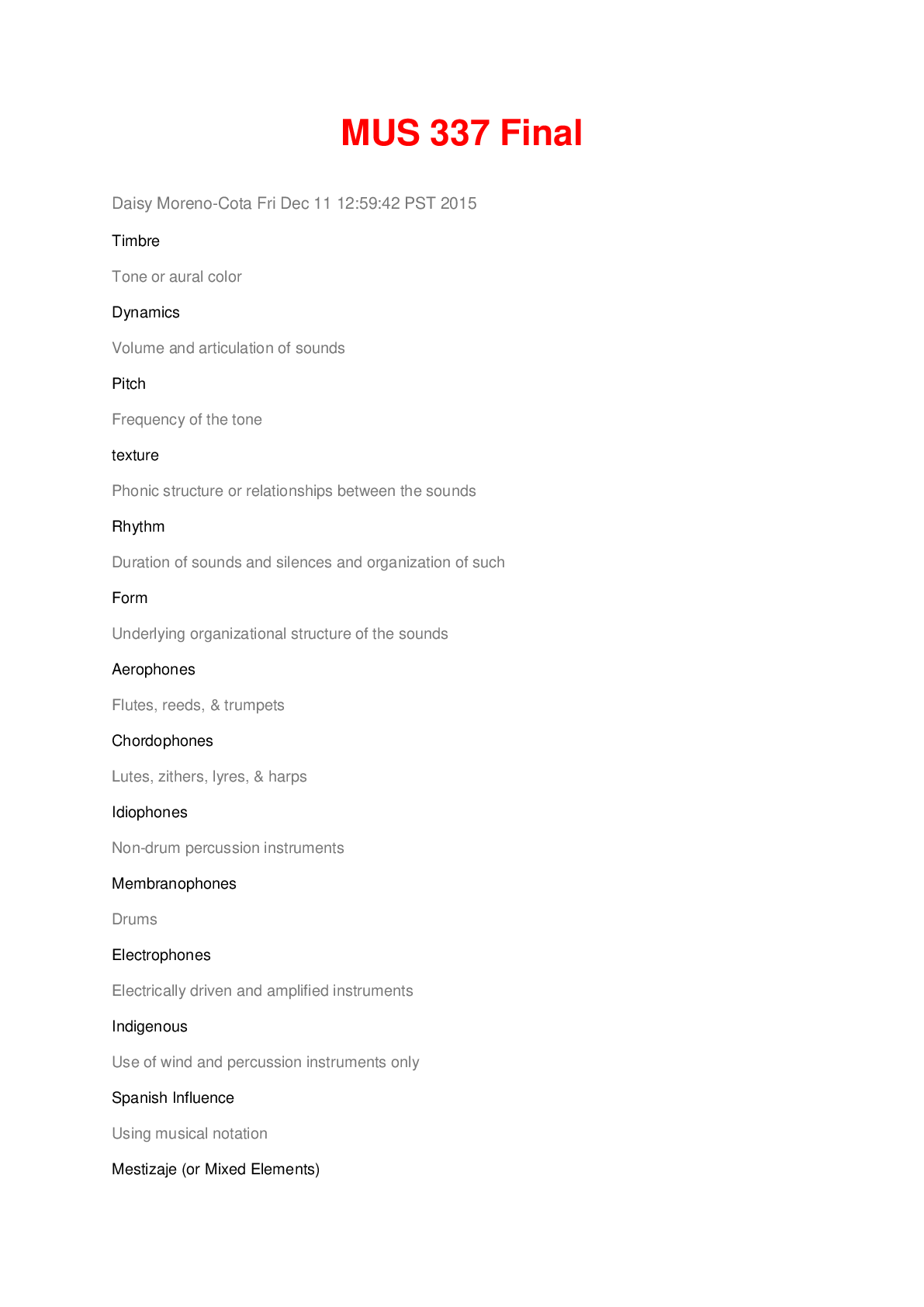Financial Accounting > QUESTIONS & ANSWERS > Equity and Trusts. Questions and Answers Based on 45 CASE STUDIES. 100% Correct (All)
Equity and Trusts. Questions and Answers Based on 45 CASE STUDIES. 100% Correct
Document Content and Description Below
Equity and Trusts. Questions and Answers for 45 CASE STUDIES. ‘Although equity will not aid a volunteer, it will not strive officiously to defeat a gift’ (per Lord Browne-Wilkinson in Choithram ... International SA v Pagarani (2001)). Evaluate this statement by reference to decided cases. QUESTION 2 In 2010, Alfred, in contemplation of his marriage with Bette, covenanted with Tim to transfer £50,000 to him to be held on trust for Bette for life, remainder to any of the chil- dren of the marriage absolutely. The marriage duly took place. A few months later Alfred made a bargain with his father-in-law, Freddie, that in consideration of receiving 10,000 shares in Cashflow Ltd (a private company), Alfred will settle his yacht, Orca, on trust for Bette for life, remainder to her brother, Charlie, absolutely. Alfred duly executed another covenant with Tim to settle his yacht, Orca on trust for Bette for life with remainder to Charlie. Alfred failed to make any transfers to Tim in accordance with the covenants although he has been registered as the new owner of 10,000 shares in Cashflow Ltd. In 2012, Bette died leaving a son, Donald. Alfred still refused to transfer any of the properties to Tim in respect of the covenants. In 2013 Alfred met Ede and decided to spend his declining years with her. In February 2014 Alfred died. Amongst his personal effects was a will, executed in January 2014, which declared that all his property was to be distributed to Ede. Ede was also appointed executrix of Alfred’s will. Advise Donald, Charlie, Freddie, Tim and Ede as to their rights, if any, in the above transactions. QUESTION 3 ‘In order for a settlor to create a valid inter vivos trust of property he owns absolutely, it is necessary both to constitute the trust perfectly and to meet certain statutory requirements.’ QUESTION 4 Alfred is the sole beneficial owner under a trust that comprises 20,000 shares in Trident Co Ltd (a private company). The trustees are Thomas and Trevor. Discuss the proprietary effect of the following alternative actions: (i) Alfred orally declares that he henceforth holds his beneficial interest in the Trident shares on trust for himself for life with remainder to Bernard absolutely. (ii) Alfred orally instructs his trustees to convey his legal title to the Trident shares to Bernard, at the same time informing Bernard that he is now the outright owner of the shares. (iii) Alfred enters into an oral contract with Bernard for the purchase of Alfred’s benefi- cial interest in the Trident shares. QUESTION 5 A young couple, Wendy and Harold, decided to get married. On the happy occasion, Wendy’s father, Frank, who was a pioneer heart surgeon, covenanted with his friends, John and Smith (who were also the executors under his will), to transfer to them £200,000 and a house in Chelsea, to hold on trust for the benefit of Wendy and Harold for their respective lives, there- after for their children and thereafter for their grandchildren. Failing issue, the trust prop- erties were to be conveyed to Norman, his next of kin, absolutely. The day after the wedding, Frank, who had made a fortune from his practice at Harley Street, received the shocking news that he had an inoperable brain tumour and that he was unlikely to live longer than 12 months. Frank then decided to sort out his affairs. He called the trustees of the above settlement and told them that he would shortly be transferring the house and cash to them. He also executed a further covenant with the trustees to transfer to them within seven days his portfolio of 20,000 shares in Lazerdot.com. Later that night, Frank executed the necessary documents relating to the various prop- erties, except for the cheque for £200,000, which he had filled in but forgotten to sign. He gave the documents to his solicitor to effect the transfers. When he went to the door to see the solicitor off, a bolt of lightning suddenly struck and killed both men instantly. Consider the issues raised by the events above and advise the executors whether any of the intended beneficiaries and donees are entitled to an interest in any of the properties Question 6 To what extent is it possible to develop a coherent theory to explain the validity of so- called secret trusts? Question 7 Thomas executed his will on 1 April, which contained a legacy of £5,000 to Arnold and a legacy of £10,000 to Betty. In his will, Thomas directed Betty to hold her legacy ‘as a matter of trust for such persons as I have communicated to her’. On 1 May, Thomas told. Arnold that he wished Arnold to pay his legacy to Thomas’s illegitimate son, Zeus. One month later, after a quarrel with Zeus’s mother, Thomas told Arnold to keep the money for himself. On 30 March, Thomas telephoned Betty and asked her whether she would be prepared to be a trustee of the money he would leave her in his will. Betty said she would think about it, and received a letter on 2 April enclosing a key to a safe where Thomas said he had deposited instructions as to the destination of the money. Betty immediately tele- phoned Thomas to assure him she would carry out his wishes. After Thomas’s death, a letter was found in the safe directing Betty to pay the money to Lucy. Thomas died on 1 August without altering his will in any way. Question 8 Sam has recently died. By his will, he bequeathed his large collection of rare stamps to ‘Peter and David absolutely’. In addition, in a separate clause in the will he left his house to William ‘on trust for purposes I have communicated to him’. Before he died, he told Peter that both he and David were to hold the stamps on trust for Becky, his illegitimate daughter. A letter repeating the same instruction to David was found amongst Sam’s personal effects after his death. David has informed you that he only became aware of Sam’s wishes regarding the stamp collection following his death. Before his death, Sam orally told William that the house was also to be held on trust for Becky. Advise Becky as to whether she is entitled to any of the properties. Question 9 Does the ‘is or is not’ test propounded by the House of Lords in McPhail v Doulton (1971) provide clarity in relation to the need for certainty of objects in the creation of a discre- tionary trust or power? Question 10 To what extent have the courts withdrawn from the fundamental principle that private purpose trusts are invalid? Question 11 Consider the validity of the following dispositions in the will of Elizabeth, who died in 2014: ‘(a) £10,000 for the erection and maintenance of a suitable monument to myself in the village of my birth and for an annual memorial service in the parish church; (b) £15,000 to the vicar of St Mary’s Parish Church to be used as she pleases in the know- ledge that nothing will be done which diminishes respect for the church; and (c) £50,000 to my trustees to be spent on the provision of tennis courts for use by the residents of my home village.’ Question 12 In 1990, pursuant to a meeting 20 individuals formed the Benevolent Parachutists Club by each transferring £5,000 to their appointed trustee-treasurer to hold as a fatal accident fund. The minutes of the meeting disclosed that the fund was to be invested and monies paid out on a certain payment scale to the surviving spouse of a member who died as a result of a parachuting accident. Further contributions to the fund had been received by gifts from anonymous donors and by entertainment organised by the members. The payment scale had been updated from time to time but involved one-off capital sums to the recipients. In 2014 the funds of the Club were valued at £20,000. Advise the treasurer-trustee as to the beneficial ownership of the funds on the assumption that he is the only surviving member of the Club. Question 13 Assess the validity of the following dispositions in the will of Thomas, who died in Decem- ber 2013: (a) £10,000 to my Aunt Agatha, knowing that she will use the money in order to secure the future of my daughters; (b) the residue of my estate to my executors for such of my colleagues at work as they shall in their discretion think fit. Thomas worked for the National Health Service at various hospitals throughout his life, but spent the last ten years of his working life in Claremont General Hospital, which was destroyed by fire just after his retirement in 2010. QUESTION 14 Bernard died last year leaving a will providing the following legacies: (a) £1,000,000 to be used to train Great Britain’s most promising young amateur athletes for the forthcoming Olympic Games; (b) £2,000,000 to be used to raise awareness of schoolchildren in London of the dangers of possessing a knife in a public place. Consider the validity of these bequests. QUESTION 15 Mark, who has recently died, made a will in 2008 in which he made the following gifts: (i) £250,000 to the University of London upon trust to establish and maintain in per petuity a School of Law Reform; (ii) £3,000 to the trustees of the South Blankshire Methodist Conference for the promo tion of physical recreation for Methodists in South Blankshire. Consider whether these gifts are charitable. QUESTION 16 Consider the validity of the following gifts in the will of Daphne, who died in 2014: (a) £100,000 to my trustees for the establishment and maintenance of a walled garden within the precincts of St Luke’s Church, for the quiet reflection of the parishioners; (b) £10,000 to my trustees to be distributed to such organisations involved in the pro tection of the environment and related causes as they shall in their absolute discre tion select; and (c) £50,000 to my trustees for the promotion of tennis in the public schools of Derbyshire. QUESTION 17 Consider the validity of the following dispositions in the will of Freddie, who died this year: (a) £10,000 on trust for the preservation of the habitat of the colony of badgers that is threatened by the work on the Manchester ring road; (b) £10,000 to the inhabitants of Littleham for the provision of a new swimming pool to be used solely by the residents thereof for such a period as the law allows; (c) £10,000 to my trustees, the income to be used for 30 years by the Lifeboat Association for the provision of rescue crafts, thence on trust for the purposes of the Society for the Promotion of Tiddlywinks. QUESTION 18 Arnold made his will in 2010, in which he left three gifts of £50,000 each to: (a) the National Association for the Homeless, an incorporated charity; (b) the Whale Protection League, a voluntary association; and (c) the Cook Home for the Disabled. When Arnold died this year, it transpired that the National Association for the Homeless had become defunct two years previously and its premises purchased by the UK League Against Homelessness. Likewise, the Whale Protection League had disbanded after dis agreements between its members, to be replaced by two organisations, the Whale and Dolphin Sanctuary and the Society for the Humane Harvesting of Whales. It also transpires that there never was a ‘Cook Home for the Disabled’. Advise as to the proper distribution of Arnold’s estate. QUESTION 19 To what extent can it be said that resulting trusts operate to support the equitable maxim that ‘equity abhors a beneficial vacuum’? QUESTION 20 The Over Village Association, a non-charitable, unincorporated body, existed to safe- guard the amenities in the village of Over. It derived its funds from members’ subscrip- tions, gifts by will and otherwise, the proceeds of local events such as jumble sales and raffles, money in collection boxes and one large anonymous donation. The village has now been granted Protected Status under European Union Regional Funds and its future is secure. The Village Association is about to be disbanded, but there is disagree- ment as to what to do with the considerable surplus funds that remain. The treasurer comes to you for advice. QUESTION 21 Consider the ownership of the equitable interests in the relevant properties, in respect of each of the dispositions made by Alfred of properties which he originally owned absolutely: (a) A transfer of 10,000 shares in British Telecom plc to his wife, Beryl, subject to an option, exercisable by their son, Charles, at any time within the next five years, to repurchase 5,000 of the shares. The shares have been duly registered in Beryl’s name and she pays 50 per cent of the dividends received to Alfred. (b) A transfer of £70,000 to the trustees of his daughter’s marriage settlement: ‘Upon trust to pay the income to my daughter, Danielle, so long as she does not have an abortion and on her death, to her husband, Ernest, and on his death to pay the capital and income to their children in equal shares.’ Five years after the transfer Danielle has an abortion. Ten years after the transfer, Danielle, Ernest and their only child, Frederick, die in a fire. QUESTION 22 Discuss the trusts issues raised in each of the situations below and advise the parties concerned: (a) Sgt Jim Tow was until recently a British member of the UN peacekeeping force in Utopia. He was in charge of the security of food depots. He has accumulated a sum of £50,000 in a London bank account. This money came from bribes he received from some civilian workers of a large aid agency working in Utopia who were illegally selling UN food supplies to private food shops. These facts have now been exposed by a Sunday newspaper. (b) Peter is the company secretary of two companies, namely X Co Ltd and Y Co plc. Six months ago he passed on to his friend, James, special company information on the two companies. James subsequently sold the information to a third company for £100,000, which he shared with Peter. QUESTION 23 A trustee must not place herself in a position where her interest and duty conflict. Discuss, with reference to decided cases. QUESTION 24 The Trustee Act 2000 contains widely drawn statutory authority permitting professional trustees to charge for their services. This is a very desirable reform of the pre-existing law. Discuss QUESTION 25 Cassandra is the registered proprietor of a large house in London. In 2008 she met Donald, a young merchant banker, and soon she had invited him to live with her. Donald willingly accepted, not least because he was about to be evicted from his own flat through his inability to pay the rent. At first, Donald insisted that he shared the expenses of running the house, but it soon became clear to him that Cassandra had more money than sense, and he accepted her generosity without complaint. After some time, Cassan- dra began talking about ‘the future’, and although he was not entirely committed to the relationship, Donald played along, especially as Cassandra had told him that the house was as good as his own now that they were together. This slice of luck encouraged Donald to abandon even what little financial caution he possessed, and he had soon spent nearly all of his savings on various luxury, but unnecessary, items of furniture for the house and far too many visits to the casino. By this time, Cassandra was becoming a little annoyed at Donald’s behaviour, and after one terrible row, in which she had told him to leave, Donald promised to mend his ways. Subsequently, he became altogether more. QUESTION 26 Analyse, with reference to decided cases, the circumstances in which a ‘stranger’ may be liable as a constructive trustee for intermeddling with the management of a trust. QUESTION 27 The liability of a stranger for meddling with trust property should be strict. Then, subject only to the defence of change of position, the courts could determine in all the circum- stances whether the defendant should return property to the beneficiaries without having to agonise about the defendant’s state of mind. Discuss. QUESTION 28 Arnold is the agent of Tarquin, the trustee of a settlement in favour of ‘the children of Sarah’. Tarquin instructs Arnold to pay £5,000 to Len, who, Tarquin says, is the illegitimate child of Sarah and himself. Tarquin also instructs Arnold to invest £10,000 in the stock exchange in Tarquin Enterprises Ltd, to buy £5,000 worth of tickets in the national lottery (all of which lose) and to transfer £10,000 to Clarence as payment for services rendered to the trust. One year later, Tarquin goes missing with the remaining trust fund monies. Moreover, it transpires that Len is in fact the child of Tarquin and Emily (Arnold’s sister) and that the money has all been spent. Tarquin Enterprises have gone bust due to a dra- matic withdrawal of cash from their bank account. Advise the children of Sarah as to their remedies, if any, against Arnold and Clarence. QUESTION 29 What are the essential requirements for a successful tracing claim at law and in equity? QUESTION 30 Charles was the trustee of a large private trust fund. He cashed a cheque for £26,000 drawn on the trust fund and gave the money to James, the trust’s financial adviser, with directions to use half to purchase shares for the trust and to use half to invest in antique furniture. James used £7,000 of the money to purchase shares in X Co in the name of the trust, and he delivered the share certificates to Charles as promised. However, he used a further £10,000 to purchase shares in Y Co in his own name, although he has now given these to his daughter as a birthday present, much to her surprise. James puts a further £5,000 in his own bank account, in which he already has some £4,000 of his own money. Out of this account, he purchases shares in Z Co to the value of £3,000, and gives them to his son. He spends the rest of the money from this bank account on a family holiday. The final £4,000 of the trust money was used to purchase antique furniture at a local auction. The shares in X Co have slumped in value; those in Y Co have remained constant; but those in Z Co have trebled in value. Unfortunately, James has disappeared, and the furni- ture turns out to be fake and is worthless. Advise Charles of any action he might take to recoup the losses to the trust fund. QUESTION 31 Zebedee is the trustee of a trust fund, holding a sum of money on trust for Dougal and Florence. At the same branch of the bank at which the trust account is held, Zebedee has his own current account which stands in credit at £500. The following events occur: (a) Zebedee pays £6,000 of the trust fund into his own account; (b) he then draws out £500 which he invests in the Roundabout Property Co; (c) he draws a further £3,000 from his account and gives it to his son, Brian, an antique dealer, who uses his skill to make a very successful purchase of a painting at auction; (d) he draws out a further £1,000, £500 of which he spends on making improvements to his house and the other £500 he gives to his daughter, Ermentrude, so that she can pay off her debt to Loanshark Co; (e) he pays £500 to the local hospital appeal, which has used the money to purchase some much needed equipment; and (f) he pays £500 into the current account of the Springboard Trust, of which he is also a trustee and which is in credit at £400. He then buys shares in Magic Co for £700 and entertains his family to dinner with the remainder. Zebedee has gone bankrupt and the shares in Roundabout Property Co have halved in value. The painting is worth £10,000 and the shares in Magic Co have trebled in value. Advise Dougal, Florence and the Springboard Trust as to their remedies, if any. QUESTION 32 By his will, Terrence appointed Edward and Edwina as his executors and trustees and bequeathed £500,000 to Lucy and £300,000 for the charitable purposes of the War Vet- erans Association. Edward and Edwina took all proper steps to prove the will and, after making all proper enquiries, paid over the monies to Lucy and the charity. However, Ter- rence had provided for David and Dee, as his residuary legatees, and they claimed success- fully that the will should be set aside on the grounds of Lucy’s undue influence over Terrence. Likewise, it appears that the War Veterans Association is not entitled to charit- able status, being merely a non-charitable association. It also transpires that Rack, a cred- itor of Terrence who had been abroad at the time of Terrence’s death, is owed a large sum of money, and he now claims £300,000. Unfortunately, the strain of this was too much for both Edward and Edwina: they turned to gambling and both are now bankrupt. Lucy, however, has spent £100,000 on com- pletely renovating her house, £150,000 on shares in the stock market and £50,000 on a year of high living. The War Veterans Association has spent all the money on providing pensions for disabled servicemen. Advise David, Dee and Rack as to their rights, if any, in Terrence’s estate. QUESTION 33 In what circumstances may a trustee successfully plead a defence to an established breach of trust? QUESTION 34 ‘A trustee may be liable to pay compensation for his own breach of trust and in some cases for those committed by others. Analyse the concept of ‘a breach of trust’ and assess whether the above is an accurate statement of the law relating to liability for breach of trust. QUESTION 35 Explain the circumstances when a court may sanction a variation of the terms of a trust. QUESTION 36 David is a solicitor to a trust. The trustees are Margaret and Norman and the beneficiaries Edward and Francis. The trust instrument contains a clause excluding the trustees from liab- ility for any loss or damage to the income or capital of the fund ‘unless such loss or damage shall be caused by their own actual fraud’. The assets of the trust included a painting which David wished to buy. David informed the trustees of his wish and, upon David’s suggestion, the trustees approached a valuer, Tony, from whom they sought a valuation of the painting. David was aware that Tony had previously been convicted of an offence involving fraud but did not reveal that fact to the trustees. The trustees themselves made no inquiry as to Tony’s character and merely accepted David’s nomination of him. Having been told by David of his wish to buy the painting, Tony puts its value at £100,000, approximately one half of its true market value, and David bought it from the trustees at that price. He has just sold it for £210,000. Discuss the possible liabilities of Margaret, Norman, David and Tony to the beneficiaries. Question 37 ‘The guidelines laid down in the American Cyanamid case were designed to achieve more certainty in the law as well as re-asserting judicial discretion.’ Discuss. Question 38 ‘The two streams of jurisdiction (law and equity) though they run in the same channel run side by side and do not mingle their waters’ W Ashburner, Principles of Equity, 1933, Butterworth & Co. Discuss. Question 39 ‘. . . in the field of equity, the length of the Chancellor’s foot has been measured or is capable of measurement. This does not mean that equity is past childbearing; simply that its progeny must be legitimate – by precedent out of principle.’ Per Bagnall J in Cowcher v Cowcher (1972). Evaluate this statement. Question 40 What factors may the court take into consideration in deciding whether to exercise its discretion concerning an order for specific performance? Question 41 ‘The decision whether or not a (search order) should be granted requires a balance to be struck between the plaintiff’s need that the remedies allowed by the civil law for the breach of his rights should be attainable and the requirements of justice that a defendant should not be deprived of his property without being heard.’ Per Scott J in Columbia Pictures Incorporation v Robinson (1986). Consider what safeguards exist to prevent abuse by a claimant in granting a search order. Question 42 Alex and Bernard are trustees under the will of Klondyke, who died in 2012. Under the terms of the trust, the trustees are to hold various items of furniture, some family heir looms and cash in Klondyke’s deposit account on trust for Perky for life, thence absolutely for such of his children then living. In 2013, Alex approached James, a stockbroker, to seek his advice on the investment of the money, and although James was only recently author ised by the Stock Exchange, he confidently recommended several investments. Alex paid over half the trust monies to James in order to carry out the recommended investment policy after telling Bernard that this was ‘purely a matter of form’. James invested the money as agreed but, due to his inexperience of high tech stocks, all the investments made a substantial loss. In response to James’s further requests, Alex paid over the rest of the monies, this time failing to consult Bernard. Due to good fortune, the second batch of investments on old fashioned ‘bluechips’ made a substantial profit and the eventual sum repaid to the trust was far in excess of the original sums invested. Meanwhile, Perky has persuaded both trustees to sell the furniture and family heirlooms and to purchase a sports car for him with the proceeds of the former and to donate the rest to charity. In 2014, Perky dies and his two living children become aware of how the trust has been administered. Have they any cause for complaint and, if so, what are their remedies? Question 43 George, a wealthy banker, comes to you for advice about a number of financial arrange ments he wishes to make for his family and others. He has already drawn up a trust deed which appoints Abbott and Hardy as his executors and trustees and charges them with distributing: (a) a reasonable amount of the money from my account at the Bounty Bank, within three years of my death, between such of my employees as my wife shall determine, the remainder to be divided equally between my children; and (b) the residue of my estate to the inhabitants of my old village of Stanbrooke in such proportions as my trustees shall in their discretion determine. During your discussions with George, it transpires that he has several bank accounts at the Bounty Bank and that his employees number over 5,000. Furthermore, your own researches reveal that the village of Stanbrooke now forms part of Greater London and is now officially called the London Borough of Stanbrooke. He seeks your advice on all of his proposals. Question 44 Mark, who has recently died, made a will in 2013 in which he made the following dispositions: (a) my houses in Southwark and Suffolk on trust for my daughters, Amanda and Barbara, for their lifetimes and thence in equal shares between such of my other kinsfolk now living as may be resident in the London Borough of Southwark, save only that no person of the Protestant faith shall be entitled to any portion. (b) the residue of my estate to Charles and David upon trust for such charitable or phil anthropic objects as my trustees shall select. (c) Consider the validity of the above dispositions. Question 45 Alfred transfers £50,000 to trustees, Joe and Jerry ‘upon trusts to distribute all or such part of the income as they in their absolute discretion shall think fit for the maintenance and training of my housekeeper’s daughter, Mary, until she graduates from university or reaches the age of 25, whichever happens first’. Mary, aged 24, has recently graduated from Brickfield University. Advise Joe and Jerry. [Show More]
Last updated: 2 months ago
Preview 1 out of 197 pages
Instant download
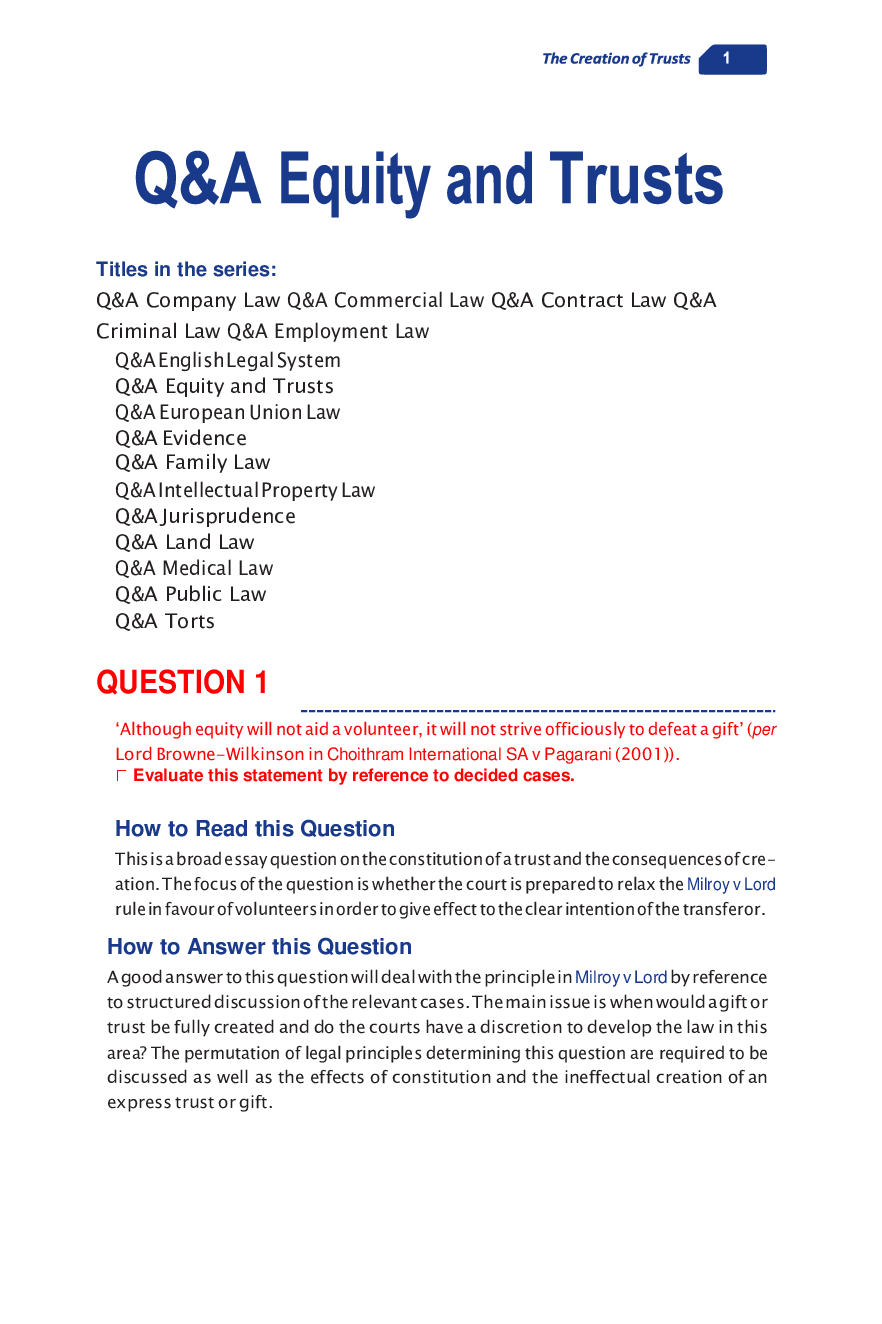
Buy this document to get the full access instantly
Instant Download Access after purchase
Add to cartInstant download
Reviews( 0 )
Document information
Connected school, study & course
About the document
Uploaded On
Mar 13, 2020
Number of pages
197
Written in
Additional information
This document has been written for:
Uploaded
Mar 13, 2020
Downloads
3
Views
306

